云南方言考试
2019云南临沧普通话考试试卷构成及评分标准

2019云南临沧普通话考试试卷构成及评分标准试卷包括5个组成部分,满分为100分。
(一)读单音节字词(100个音节,不含轻声、儿化音节),限时3.5分钟,共10分。
1.目的:测查应试人声母、韵母、声调读音的标准程度。
2.构成:(1)100个音节中,70%选自《普通话水平测试用普通话词语表》“表一”,30%选自“表二”。
(2)100个音节中,每个声母出现次数一般不少于3次,每个韵母出现次数一般不少于2次,4个声调出现次数大致均衡。
(3)音节的排列要避免同一测试要素连续出现。
3.评分标准:(1)语音错误,每个音节扣0.1分。
(2)语音缺陷,每个音节扣0.05分。
(3)超时1分钟以内,扣0.5分;超时1分钟以上(含1分钟),扣1分。
4.声母选定的幅度:6-3次d l j q x zh ch sh5-3次b m f t g h z3-2次p n k r c s5. 韵母选定的幅度:4-3次i,u,ian,ing,an,-i(后),ong,ao,ang,e,eng,uei,ai3-2次en,iao,uan,in,ou,a, ü,uo,-i(前),uen,iou,ie,iang,ei,uang,ia, üe2-1次ua,o, üan,uai,iong, ün1-0次er,ueng(二)读多音节词语(100个音节),限时2.5分钟,共20分。
1.目的:测查应试人声母、韵母、声调和变调、轻声、儿化读音的标准程度。
2.构成:(1)词语的70%选自《普通话水平测试用普通话词语表》“表一”,30%选自“表二”。
(2)声母、韵母、声调出现的次数与读单音节字词的要求相同。
(3)上声与上声相连的词语不少于3个,上声与非上声相连的词语不少于4个,轻声不少于3个,儿化不少于4个(应为不同的儿化韵母)。
(4)词语的排列要避免同一测试要素连续出现。
3.评分标准:(1)语音错误,每个音节扣0.2分。
云南普通话考试口头作文

云南普通话考试口头作文篇一《我在云南的美食奇遇》云南这地儿啊,那美食就像天上的星星一样多。
我去云南旅游的时候,可算是好好体验了一把。
刚到云南,我就直奔昆明的大街小巷。
当时我那个兴奋劲儿啊,眼睛就跟探照灯似的到处扫射。
走着走着,就闻到一股特别奇妙的香味。
顺着香味一找,原来是一家小馆子,里面卖的是过桥米线。
那场面可真够独特的,一大桌子的配菜,有切成薄片的生肉、新鲜的蔬菜、还有各种菌类啥的。
那米线就像小姑娘顺滑的发丝。
锅里的汤冒着腾腾热气,看着就诱人。
我学着旁边人的样子,把配菜一股脑儿倒进热汤里。
生肉碰到热汤那一下,立马变得白白嫩嫩的。
米线吃起来筋道,汤也鲜香得不得了,每一口都像是各种食材在嘴巴里面开派对。
我像个饿狼似的,一边吃一边还瞅着周围人的碗,觉得他们的看起来也很美味。
从那以后啊,我就对云南美食上了瘾。
满脑子想的都是啥时候再去吃一回过桥米线。
在云南的日子里,我就像个美食探险家,东找西寻的。
那些独特的美食就像一个个宝藏,每次发现都能让我高兴好半天。
云南小吃啊,就是有这样的魔力,把每个游客的心啊,都抓得死死的。
到现在只要一提起云南,我第一个想到的就是那碗热腾腾的过桥米线。
这小小的一碗米线,却藏着云南大大的热情和好客呢。
篇二《云南的动物伙伴》云南这地方,动物可多了呢。
我有一次在云南的郊外,那可算是和小动物们来了一场有趣的邂逅。
那天我跟着当地的向导走进一片树林。
刚进去的时候,周围特别安静,只能听到自己的脚步声。
不过走着走着,就听到头顶上有叽叽喳喳的声音。
抬头一看,好家伙,树上密密麻麻都是小鸟。
五彩斑斓的羽毛在树叶的缝隙透出的阳光下闪闪发光。
我就这么仰着头看,脖子都酸了。
向导笑着说这只是小场面。
我们继续往前走,不一会儿,就听到草丛里有窸窸窣窣的声音。
我心说这又是什么呢。
然后就看到一只小松鼠,毛茸茸的大尾巴在后面一甩一甩的。
它那小眼睛滴溜溜地看着我们,一点都不怕人。
那小爪子捧着一个坚果,在那儿啃啊啃的。
我想去摸摸它,就慢慢蹲下来,伸出手。
云南省普通话考试真题模拟六
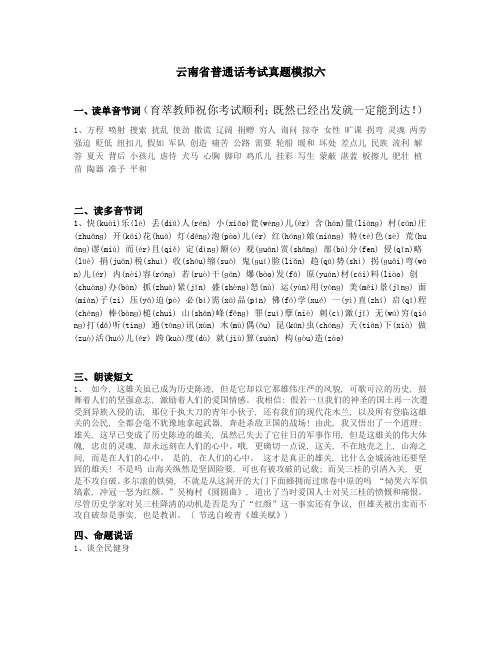
云南省普通话考试真题模拟六一、读单音节词(育萃教师祝你考试顺利;既然已经出发就一定能到达!)1、方程喷射搜索扰乱使劲撒谎辽阔捐赠穷人询问掠夺女性旷课拐弯灵魂两旁强迫贬低纽扣儿假如军队创造痛苦公路需要轮船暖和坏处差点儿民族流利解答夏天背后小孩儿虐待犬马心胸脚印鸡爪儿挂彩写生蒙蔽湛蓝板擦儿肥壮植苗陶器准予平和二、读多音节词1、快(kuài)乐(lâ) 丢(diū)人(rãn) 小(xiǎo)瓮(wânɡ)儿(ãr) 含(hán)量(liànɡ) 村(cūn)庄(zhuünɡ) 开(küi)花(huü) 灯(dýnɡ)泡(pào)儿(ãr) 红(hïnɡ)娘(niánɡ) 特(tâ)色(sâ) 荒(hu ünɡ)谬(miù) 而(ãr)且(qiþ) 定(dìnɡ)额(ã) 观(ɡuün)赏(shǎnɡ) 部(bù)分(fen) 侵(qÿn)略(lûâ) 捐(juün)税(shuì) 收(shōu)缩(suō) 鬼(ɡuí)脸(liǎn) 趋(qū)势(shì) 拐(ɡuǎi)弯(wün)儿(ãr) 内(nâi)容(rïnɡ) 若(ruî)干(ɡün) 爆(bào)发(fü) 原(yuán)材(cái)料(liào) 创(chuànɡ)办(bàn) 抓(zhuü)紧(jǐn) 盛(shânɡ)怒(nù) 运(yùn)用(yînɡ) 美(mþi)景(jǐnɡ) 面(miàn)子(zi) 压(yü)迫(pî) 必(bì)需(xū)品(pǐn) 佛(fï)学(xuã) 一(yì)直(zhí) 启(qǐ)程(chãnɡ) 棒(bànɡ)槌(chui) 山(shün)峰(fýnɡ) 罪(zuì)孽(niâ) 刺(cì)激(jÿ) 无(wú)穷(qiïnɡ)打(dǎ)听(tinɡ) 通(tōnɡ)讯(xùn) 木(mù)偶(ǒu) 昆(kūn)虫(chïnɡ) 天(tiün)下(xià) 做(zuî)活(huï)儿(ãr) 跨(kuà)度(dù) 就(jiù)算(suàn) 构(ɡîu)造(zào)三、朗读短文1、如今, 这雄关虽已成为历史陈迹, 但是它却以它那雄伟庄严的风貌, 可歌可泣的历史, 鼓舞着人们的坚强意志, 激励着人们的爱国情感。
云南统考播音真题答案及解析

云南统考播音真题答案及解析云南统考播音是备受关注的一项考试,对于广大播音专业的学生来说,它是他们展示自己专业能力的重要机会。
因此,掌握云南统考播音真题的答案及解析对于备考者来说是非常重要的。
接下来,我们将对云南统考播音真题进行解析,帮助考生更好地备考。
一、听力理解部分云南统考播音听力理解部分是一项考验考生听力能力和理解能力的重要环节。
通常,听力理解部分会包括听力材料和问题,考生需要听录音并回答问题。
以下是一道听力理解的真题及答案及解析示例。
【听力理解材料】Thank you for calling our customer service hotline. If you have any questions or need assistance, please stay on the line, and one of our representatives will be with you shortly. Your call is important to us.【问题】1. What can customers do if they have questions or need assistance?A. They can send an email.B. They can visit our office.C. They can stay on the line and wait for a representative.D. They can leave a message.【答案及解析】1. 问题要求考生回答顾客有什么办法可以得到问题解答或是寻求帮助。
通过听力材料我们可以得知,顾客可以继续保持通话并等待代表人员的接听。
因此,C为正确答案。
二、口语表达部分云南统考播音口语表达部分是考察考生口语能力以及口头表达能力的重要考试环节。
这一部分通常包括朗读篇章或者简短的演讲。
以下是一道口语表达的真题及答案及解析示例。
普通话考试云南方言易错字
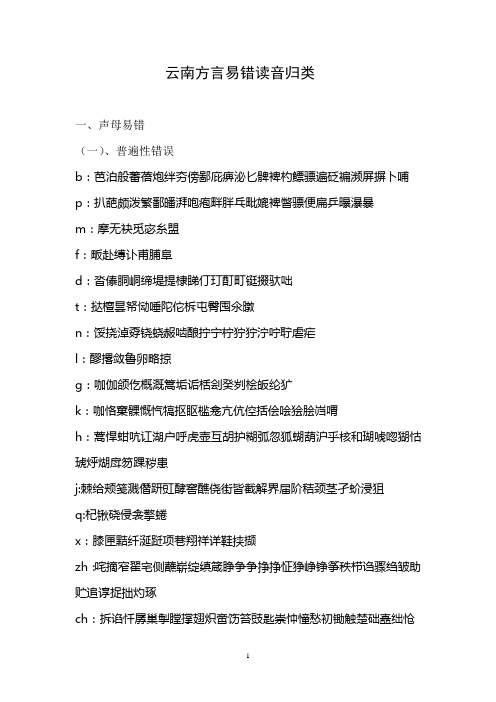
云南方言易错读音归类一、声母易错(一)、普遍性错误b:芭泊般蕃蓓炮绊夯傍鄙庇痹泌匕髀裨杓鳔骠遍砭褊濒屏摒卜哺p:扒葩颇泼繁鄱皤湃咆疱畔胖乓毗媲裨瞥骠便扁乒曝瀑暴m:摩无袂觅宓糸盟f:畈赴缚讣甫脯阜d:沓傣胴峒缔堤提棣睇仃玎酊町铤掇驮咄t:挞檀昙帑恸唾陀佗柝屯臀囤氽暾n:馁挠淖孬铙蛲赧啮酿拧宁柠狞狞泞咛聍虐疟l:醪撂敛鲁卵略掠g:咖伽颌仡概溉篙垢诟栝刽癸刿桧皈纶犷k:咖恪窠髁慨忾犒抠眍槛龛亢伉倥括侩哙狯脍岿喟h:蒿悍蚶吭讧湖户呼虎壶互胡护糊弧忽狐蝴葫沪乎核和瑚唬唿猢怙琥烀煳戽笏踝秽患j:棘给颊笺溅僭趼豇酵窖醮侥街皆截解界届阶秸颈茎孑蚧浸狙q:杞锹硗侵衾擎蜷x:膝匣黠纤涎跹项巷翔祥详鞋挟撷zh:咤摘窄翟宅侧蘸崭绽缜箴睁争争挣挣怔狰峥铮筝秩栉诌骤绉皱助贮追谆捉拙灼琢ch:拆谄忏孱巢掣瞠撑翅炽啻饬笞豉匙崇忡憧愁初锄触楚础矗绌怆sh:生绳甥牲笙事师狮虱士柿仕侍恃谥似数梳束蔬疏薯暑曙署蜀鼠庶漱闩吮r:刃韧纫冗褥z:匝扎暂造燥躁噪甑兹诅c:踩囱淙窜蹿篡s:似嗽夙榫(二)、特殊性错误I、n和l的辨析[记字办法]1、记少不记多2、记特殊字:内馁虐嫩酿怒泞挠暖3、记代表字,声旁类推那:哪娜内:纳衲钠呐尼:泥呢妮怩诺:匿纽:妞扭钮忸挠:蛲铙奴:怒努弩驽捏:涅脑:恼瑙乃:奶氖南:喃奈:捺念:埝捻宁:拧柠狞泞咛聂:蹑镊农:浓脓哝侬II、zh ch sh和z c s的辨析[记字办法]1、记少不记多,记z c c2、记代表字,声旁类推(二)、韵母易错o、e韵易错字表u韵易错字表er韵代表字ü韵字表ai韵易错字表ei韵易错字表ao韵易错字表ou韵字表ie韵字表i-ie对比练习一切低劣一瞥熄灭离别缔结地铁ie-i对比练习液体夜里切题歇息贴息ǖe韵字表üan韵字表ün韵字表an、ang辨音字表ai-an对比练习快餐百般白班白板派款贷款耐烦开饭海滩灾难an-ai对比练习安排按捺ao-ang对比练习iao-iang对比练习en、eng辨音字表ei-en对比练习悲愤备份辈分每人媒人美人非分贼人en-ei对比练习纷飞分肥奋飞粪肥分内in、ing辨音字表ueng韵代表字①翁嗡③蓊④瓮蕹(三)、声调易错(一)、云南方言与普通话不一致的部分字(二)、入声字归音表普通话水平测试朗读篇目(1)在浩瀚无垠的沙漠里,有一片美丽的绿洲,绿洲里藏着一颗闪光的珍珠。
云南省普通话考试资料(最新版)
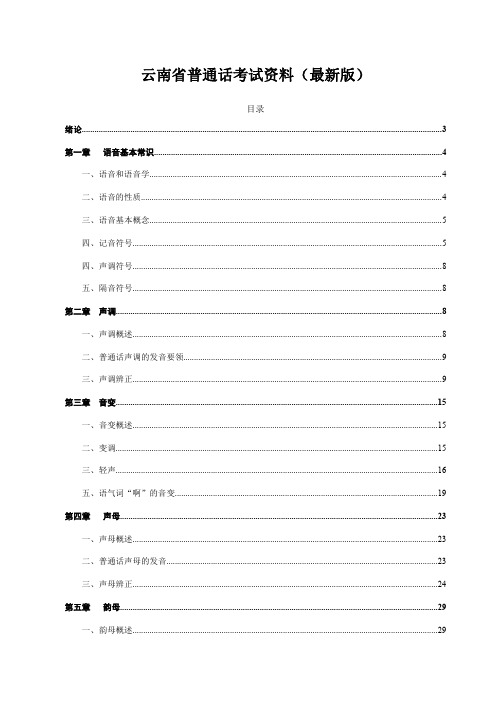
目录 绪论..........................................................................................................................................................................3 第一章 语音基本常识...................................................................................................4
一、语音和语音学..........................................................................................................................................4 二、语音的性质..............................................................................................................................................4 三、语音基本概念..........................................................................................................................................5 四、记音符号..................................................................................................................................................5 四、声调符号..................................................................................................................................................8 五、隔音符号..................................................................................................................................................8 第二章 声调..........................................................................................................................................................8 一、声调概述..................................................................................................................................................8 二、普通话声调的发音要领..........................................................................................................................9 三、声调辨正..................................................................................................................................................9 第三章 音变........................................................................................................................................................15 一、音变概述................................................................................................................................................15 二、变调........................................................................................................................................................15 三、轻声........................................................................................................................................................16 五、语气词“啊”的音变............................................................................................................................19 第四章 声母......................................................................................................................................................23 一、声母概述................................................................................................................................................23 二、普通话声母的发音................................................................................................................................23 三、声母辨正................................................................................................................................................24 第五章 韵母......................................................................................................................................................29 一、韵母概述................................................................................................................................................29
云南高考口语题型总结与分析
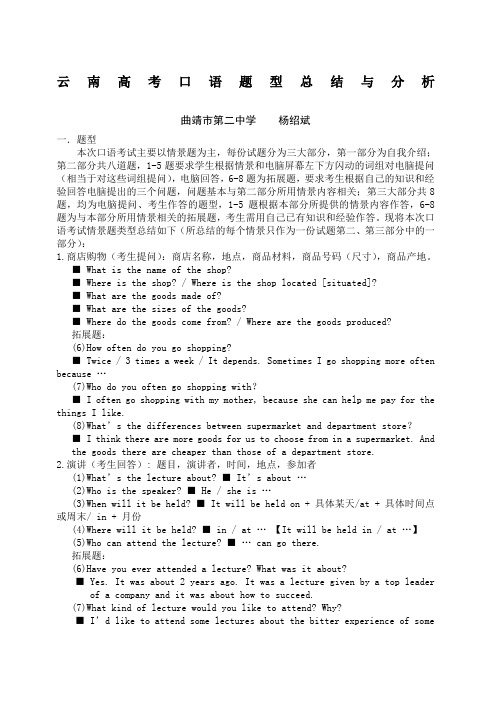
云南高考口语题型总结与分析曲靖市第二中学杨绍斌一.题型本次口语考试主要以情景题为主,每份试题分为三大部分,第一部分为自我介绍;第二部分共八道题,1-5题要求学生根据情景和电脑屏幕左下方闪动的词组对电脑提问(相当于对这些词组提问),电脑回答,6-8题为拓展题,要求考生根据自己的知识和经验回答电脑提出的三个问题,问题基本与第二部分所用情景内容相关;第三大部分共8题,均为电脑提问、考生作答的题型,1-5题根据本部分所提供的情景内容作答,6-8题为与本部分所用情景相关的拓展题,考生需用自己已有知识和经验作答。
现将本次口语考试情景题类型总结如下(所总结的每个情景只作为一份试题第二、第三部分中的一部分):1.商店购物(考生提问):商店名称,地点,商品材料,商品号码(尺寸),商品产地。
■ What is the name of the shop?■ Where is the shop? / Where is the shop located [situated]?■ What are the goods made of?■ What are the sizes of the goods?■ Where do the goods come from? / Where are the goods produced?拓展题:(6)How often do you go shopping?■ Twice / 3 times a week / It depends. Sometimes I go shopping more often because …(7)Who do you often go shopping with?■ I often go shopping with my mother, because she can help me pay for the things I like.(8)What’s the differences between supermarket and department store?■ I think there are more goods for us to choose from in a supermarket. And the goods there are cheaper than those of a department store.2.演讲(考生回答): 题目,演讲者,时间,地点,参加者(1)What’s the lecture about? ■ It’s about …(2)Who is the speaker? ■ He / she is …(3)When will it be held? ■ It will be held on + 具体某天/at + 具体时间点或周末/ in + 月份(4)Where will it be held? ■ in / at …【It will be held in / at …】(5)Who can attend the lecture? ■… can go there.拓展题:(6)Have you ever attended a lecture? What was it about?■ Yes. It was about 2 years ago. It was a lecture given by a top leader of a company and it was about how to succeed.(7)What kind of lecture would you like to attend? Why?■I’d like to attend some lectures about the bitter experience of somesuccessful people, because I can get inspired from their experience.(8)Today more and more Chinese people celebrate western festival, what doyou think of it?■ As a Chinese, I think we should be open to foreign cultures. Celebrating foreign festivals can further our understanding of both the countries from which these festival come from and our own country. But we must remember that we should not forget our own festivals, for if we let them disappear, there will be a cultural gap, which foreign cultures may fill.3.朋友简介(考生提问):姓,年龄,国籍,爱好,父母职业■ Is … a male or a female? / What is the gender of …?■ How old is …?■ What is …’s nationality? / Where does …come from? / Where is …’s home country?■ What is …’s likes and dislikes?■ What do …’s parents do? What are …’s parents? / What are …’s parents’occupation?拓展题:(6)Have you had a foreign teacher? Where does he come from?■ Yes. He is from America / he comes from …(7)Do you like traveling? Why or Why not?■ Of course. When I travel, I can see other countries and visit places that are famous, interesting or beautiful. I can also meet new friends, try new kinds of food. Sometimes I just travel for a change, for I sometimes feel bored staying at home.(8)What do you think are the difficulties when living in a foreign country?■ Communication, I think, would be the major problem, for there exists cultural shock. Even if I may understand the language there, I may notunderstand the way of thinking. And the climate there may also causetrouble. To get used to the climate may take some time.4.中山公园(考生回答): 地点,公园名称,开放时间,门票,特色(1)What’s the name of the park? ■ Zhong Shan Park(2)Where is the park? ■ It is located on / in / at …(3)What are the opening hours? ■ It opens at … and the opening hours last for …hours.(4)How much is the ticket for the park? ■ It costs …Yuan.(5)What are special about the park?拓展题:(6)Who do you often go to parks with?■ I often go to parks with my sister because we are both students. We usually devote much of our spare time to homework. So we need to have a rest. And the air in parks is fresh and …(7)What do people usually do in parks?■ People in parks usually have a walk while they are chatting with each other.Some people visit parks because of their children who usually like playingin parks because there are some recreation facilities which are of some interest to them.(8)Describe a park you have been to.■ I have been to many parks. But the park I often go to is the one near our school. There lie many lakes in which fish are swimming. People there often bring with them some food to feed the fish. And a statue of a dragon is put at the centre of the park. As you know in China dragons are considered to be a kind of animal which can bring people good luck. So adults usually take their children there.5.生日聚会(考生回答):谁的生日聚会,时间,地点,参加聚会的人,活动方式■ It is a party for …■ When is the party given/ held?■ Where is the party given / held ?■ Who will go to the party? / Who will be present at the party? / Who will attend the party?■ How will the party be organized? / How will the party be celebrated?拓展题:(6)Do you buy any gift when you attend a party? What kind of gifts do you buyto attend a party?■ Of course. A gift is necessary when we attend a party. It is a sign of respect.As to what kind of gift I bring, it depends. Because the likes and dislikes of the person I buy gifts for should be taken into consideration.(7)Do you like parties? Why?■ It’s hard to say. Sometimes I feel lonely and want to get to some places which are noisy, especially when I hear loneliness sing. Sometimes I want to just stay alone reading some books which may make me have a sense of fulfillment.(8)How do you celebrate an important day?■ The way I celebrate an important day is linked to the reason why it is important, for example, Teachers’ Day is important because I get a sea of knowledge from my dear teachers. I may buy a bunch of flowers for them to show my gratitude.6.暑假培训班(考生提问): 老师姓名,班级人数,开课时间,课程安排,活动内容■ What is the name of the teacher? / May I know the name of the teacher?■ How many people will be there in the class?■ When does the class begin?■ How will the course be arranged?■What will be included in the course? / What will be taught in the course? 拓展题:(6)What would you like to do in summer?■ Summer is a wonderful season. There are many things that I can do in summer.I can go into mountains in the countryside to collect mushrooms. Many fruit are in season. I can go to pick all kinds of fruits and you know they are delicious.(7)Do you think it is necessary to take an English class to learn English? ■ It depends on the degree to which you want to learn English well. If you want to learn English well enough to be able to do translation, then a lot of English classes should be attended. However, if you learn English for daily communication, I think English classes are not a must. Of course by attending English classes, you can lean formal English and you can also make rapid progress.(8)What advantages to have an native English teacher?■ Having an native English teacher is, without any doubt, of great advantage.7.川菜馆(考生回答):名称,地点,营业时间,本月优惠,推荐菜品(1)What’s the name of the restaurant?(2)Where is the restaurant?(3)What are the business hours?(4)Is any special offered this month?(5)What dishes would you like to suggest?■ fried rice 炒饭/spring roll 春卷/ beef stick 牛肉串 / sliced pork with pepper 青椒肉片 / double sautéed pork 回锅肉/ Ma Po Dow Fu / toast / coffee 拓展题:(6)What are your favorite dishes? 【同上】(7)Do you like eat outside or cook at home?■ Sometimes I eat outside because I have no time for cooking. And during holidays and at weekends I cook at home.(8)What places do you dislike going to? ■ The last place I’d like to go to is cinema.8.旅店(考生提问):名称,价格,地点,特色,其他服务■ What is the name of the hotel?■ What is the price / rate of the room?■ Where can I find the hotel?■ What is special about the hotel? / What is the feature of the hotel?■ Are there any other kinds of services?拓展题:(6)How often do you travel? ■ Usually twice a year.(7)What are necessary things when you are prepare for travel?■ I take some necessities, such as teeth brush, towel, some clothes for getting changed, some cash and, most important, my ID card.(8)Where would you like to stay when travelling, a city hotel or a countryarea, why?■ An country area is better, because I can go for a walk along the country road, taking in some fresh air and admiring the beautiful scenery.9.本城新建公园(考生提问):位置,往返交通,游览项目,园内何处就餐,门票■ Where is the location of the park? / Where is the park located?■ How can I get to the park?■ What can we (people) see in the park?■ Can we have dinner in the park? Where?■ How much is the entrance ticket? / What is the price of the entrance ticket? 拓展题:(6)What do you usually do in a park?(7)Who do you like going to parks with, you family or your parents, why?(8)Do you think it is reasonable for a park to charge for entrance?■ I think it is ridiculous to charge for entrance. Because the money used to build parks is usually paid by the public in the form of taxes, so the park built with the money, with no doubt, should be open to the public in return in order to benefit them.10.欢迎新外教(考生回答):教授姓名,在美国任教学校,主要研究兴趣,出版着作,在中国会呆多久(1)What’s the name of the professor? ■ His name is …(2)Which university did he teach in America? ■ He teaches in …(3)What are his main research interests? ■ His mainly does research into …(4)What book has he written? ■ The books he has written include …(5)How long will he stay in China? ■ He will stay in China for …拓展题:(6)What do students usually learn in an art class?■ They usually learn to enjoy the beauty of some works of art [艺术作品],and some theories about how to create beauty in the form of art. The final goal, I think, is to learn to be able to create beauty on their own [independently].(7)Do you prefer Chinese teachers or foreign teachers to teach your English,why?■ It varies [depends]. When it comes to lessons about grammar, I think Chinese teachers are better, because they can help me better understand the rules by explaining in Chinese. However, native speakers can help us learn better oral English and pick up more accurate pronunciations.(8)What do you think a perfect job should be like?■ I think a good job is one where one can display one’s abilities. That is to say, a job that is suitable for one to do is certainly a good job. 11.研究生新宿舍申请(考生回答):一间宿舍住几人,餐厅的位置,宿舍楼位置,每月住宿费,咨询电话或邮箱(1)How many people share a room?(2)Where can I have meals?(3)Where is the new building?(4)How much shall I pay every month?(5)How can I get more information?拓展题:(6)Whom do you live with now? How do you like it?■ I now live with my classmates, sharing the same dorm. We get along well and are ready to help each other. So, l like living with them.(7)What are the advantages and disadvantages of living by oneself?■ Living alone has both advantages and disadvantages. We can always do somethingaccording to our own will. But when we need help and feel lonely, living by ourselves is not so good.(8)What do you think of the food in your school or work place?■ Wonderful! They taste good and there are a variety if them for us to choose from.12.假期计划(考生提问):假期天数,目的地,活动安排,参与人员,何处住宿■ How long will our holiday last?■ Where shall we spend our holiday?■ What will are we going to do during the holiday?■ Who will spend the holiday with us? / Who will take part in the holiday? ■ Where will we live during the holiday?拓展题:(6)What different things have you done to enjoy the holidays?■ The thing that comes first during a holiday is relaxing myself. And besides that I also want to learn something new in the process. I can experience different cultures and learn the lifestyle of different placers. Making new friends also occupy an important position in my travel.(7)What kind of museums interested you most? Why?■ Museums about history interest me most because history can cause us to stop, look and listen. And more importantly, things about the past, if correctly understood, can tell us what to do and what not to do.(8)Do you like spending your holidays with your friends or family, why?■ I like to spend my holidays with both my friends and family, because I value them beyond all things, and I want to share all my sorrow and happiness with them.13.校外房屋出租(考生提问):房屋类型、月租金、离学校多远、公交线路、何时入住■ What is the room / house look like?■ What is the rent on the house / room each month?■ How far is it from the house to the school? / What is the distance to the room [house]?拓展题:(6)If you could choose, where or with whom would you like to live?■ l would like to live in Shangri-La with my friends, which is said to be a place like the paradise.(7)Do you think it is a good idea for students to live outside the campus?Why or why not?■ I don’t think it a good idea to live outside the campus. Students are still young and lack experience; therefore they may easily be taken in.(8)Nowadays, more and more people prefer to living countryside, what’s youropinions about it?■The quiet life of the country always appeal to many people. The reasons, as they put it, are that people there are friendly: the atmosphere is clean, and it is close to nature. The most important thing is that the pace of living there is gentle.14.西方油画讲座(考生回答):主题、演讲者、讲座时间、地点、参与人拓展题:(6)What are you good at doing? ■ I am good at …(7)What school activities are best welcomed by students?■ The majority of the students prefer to be involved in activities like parties, football games because they need to plan and organize them, which can help display their abilities.(8)What would you like to learn in your free time? Why?■ I usually dance to light music in my free time, because in that way I can relax myself.15.夜校(考生提问):学员类型、上课时间、课程种类、学费、上课地点■ Who usually take the course?■ When is the lesson given?■ What are included in the course?■ How much should I pay in order to take the course? / What is the charge if I want to take the course? / How much do they charge for taking the course? / What is the tuition?拓展题:(6)What would you like to do to make the elderly people in your family happy? ■ So we should often meet them and talk with them. I usually have dinner together with them, during which I chat about a lot of things that happen to me.When I stay far from them, I just make phone calls and make them feelcared.(7)What do you think of the elderly people going to school?■ Older people’s going to universities is a response to the policy of taking people as the most important 【以人为本】where lifelong learning is advocated. It is also a sign of older people’s being aware of the progress of society. In schools, older people can communicate with each other and update their knowledge, which will make it possible for them to further contribute to society.(8)Do you think the society takes good care of old people?■ Yes, I think so. More and more homes for the aged have been built around the country, which means that much attentions has been attached to the business of taking good care of old people. But we can still notice some old people living miserable lives. So there is a lot left that should be done to improve the lives of the old.16.音乐会(考生回答):演奏会名称、演奏者、演奏内容、时间、入场费拓展题:(6)When do you feel like listening to music?■ I feel like listening to music when I feel tired or sad. Music can help me feel fresh and forget the sorrows.(7)What kind of music do you like? Why do you like it?■ I like country music because I can understand most of the words. And I think it’s the most beautiful music you can find. Some country music is about the friendliness between people. It can also remind me of the life in the open airwhich is full of sunshine, flowers, birds singing and laughing. That is the lifeI experienced when I was still a child.(8)What do you think of children learning to play music at early ages?■ Unlike words printed in books which need thinking about before you can understand, music has immediate influence on a person’s soul. They can feel the beauty by using their “heart” but a child can not read a novel before he can understand several thousand words. So beautiful music can help shape a person’s soul and help them form better personalities.二.考生注意事项:1.认真听题,避免答非所问;2.注意情景开始前的简介与提示;3.学生对电脑提问部分,注意频幕左下方闪亮词提示(作答方式几乎等同于对划线部分提问);4.避免重复和口头语;5.大胆开口,不怕出错,在流利的基础上追求语句的准确度;6.及时答题,不拖时;7.避免他人干涉;8.自我介绍简单明了,不宜占用过多时间;9.回答电脑提问时注意问题类型:非一般疑问句的答语前尽量克服“yes”答语;10.不能及时说出完整答语时,抓紧时间说出回答问题的关键词;11.避免说出自己的学校及老师。
2019云南普通话考试试卷构成及评分标准
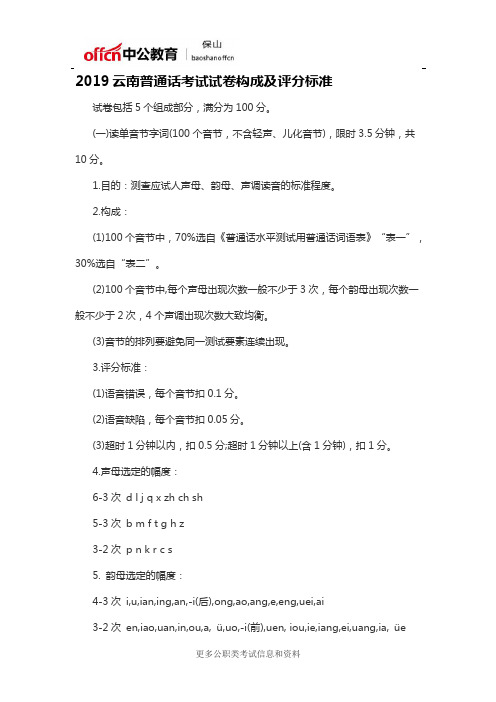
2019云南普通话考试试卷构成及评分标准试卷包括5个组成部分,满分为100分。
(一)读单音节字词(100个音节,不含轻声、儿化音节),限时3.5分钟,共10分。
1.目的:测查应试人声母、韵母、声调读音的标准程度。
2.构成:(1)100个音节中,70%选自《普通话水平测试用普通话词语表》“表一”,30%选自“表二”。
(2)100个音节中,每个声母出现次数一般不少于3次,每个韵母出现次数一般不少于2次,4个声调出现次数大致均衡。
(3)音节的排列要避免同一测试要素连续出现。
3.评分标准:(1)语音错误,每个音节扣0.1分。
(2)语音缺陷,每个音节扣0.05分。
(3)超时1分钟以内,扣0.5分;超时1分钟以上(含1分钟),扣1分。
4.声母选定的幅度:6-3次d l j q x zh ch sh5-3次b m f t g h z3-2次p n k r c s5. 韵母选定的幅度:4-3次i,u,ian,ing,an,-i(后),ong,ao,ang,e,eng,uei,ai3-2次en,iao,uan,in,ou,a, ü,uo,-i(前),uen, iou,ie,iang,ei,uang,ia, üe2-1次ua,o, üan,uai,iong, ün1-0次er,ueng(二)读多音节词语(100个音节),限时2.5分钟,共20分。
1.目的:测查应试人声母、韵母、声调和变调、轻声、儿化读音的标准程度。
2.构成:(1)词语的70%选自《普通话水平测试用普通话词语表》“表一”,30%选自“表二”。
(2)声母、韵母、声调出现的次数与读单音节字词的要求相同。
(3)上声与上声相连的词语不少于3个,上声与非上声相连的词语不少于4个,轻声不少于3个,儿化不少于4个(应为不同的儿化韵母)。
(4)词语的排列要避免同一测试要素连续出现。
3.评分标准:(1)语音错误,每个音节扣0.2分。
- 1、下载文档前请自行甄别文档内容的完整性,平台不提供额外的编辑、内容补充、找答案等附加服务。
- 2、"仅部分预览"的文档,不可在线预览部分如存在完整性等问题,可反馈申请退款(可完整预览的文档不适用该条件!)。
- 3、如文档侵犯您的权益,请联系客服反馈,我们会尽快为您处理(人工客服工作时间:9:00-18:30)。
一、选择题(每题3分,共75分)
1、“鬼火录”是什么意思?
A、磷火
B、很生气、发火
C、打架
2、“你这事是老火了”中的“老火”是什么意思?
A、过时
B、老辣
C、严重
D、厉害
3、“你这人真的是神了”中的“神”是什么意思?
A、人精神不正常
B、神仙
C、神机妙算
D、不合情理
4、“你葛来?”的意思:
A、你过来
B、你去了来
C、去去就来
D、你来吗
5、“给你两把头”是什么意思?
A、形容要打人,给你脸上两巴掌的意思
B、给你什么好的东西
C、无特殊意思
6、云南人经常挂在嘴边的“买买”所表示的意思是:
A、表示强烈的购买欲望
B、表示强烈的惊讶
C、表示十分高兴
7、“甩米线”是什么意思?
A、做米线
B、把米线丢了
C、吃米线
D、卖米线
8、父亲抱着孩子在圆通山动物园,指着一个残疾的动物对孩子说:
“买买,赶跌看,特只有一个国!”
这位父亲说的“国”指的是:
A、上肢
B、翅膀
C、角
D、爪子
9、发生口角之争,以武力相威胁时,男人一般会威胁说:
“你葛是想我挺你两托才好在”,此时他所说的动作是?
A、用脚题对方两脚
B、用拳击打对方两拳
C、用肘击对方两下
10、见面打招呼时一般会说的是:
A、你整喃样
B、你葛吃得啦
C、你要克哪点
D、出来玩改
11、“说我呢左边”可以用来:
A、自我批评
B、否定别人
C、介绍自己
D、指点方向
12、“鬼眯日眼”是:
A、动词
B、名词
C、副词
D、形容词
13、“马普”全称:
A、马克思主义普遍原理
B、马术普及
C、训马技巧
D、马街普通话
14、“卡拉国罗”指:
A、去唱卡拉OK吧
B、保卫祖国
C、墙边角落
D、拟声词
15、“诺诺”的意思是:
A、睡觉
B、懦弱
C、可爱
D、暗恋
16、云南话里的“板扎”意思是:
A、家具样式
B、骂人的话
C、做的非常好
17、“咋个整”最对应的是:
A、唱歌
B、怎么办
C、翘辫子
18、“曹耐/物俗”云南方言中是:
A、骂人是话
B、赞美人的话
C、形容词
19、云南话中“大街小巷”的正确发音应该是:
A、da jie xiao xiang
B、da jie xiao han
C、da gai xiao hang
D、da gai xiao han
20、学校放学以后,很多学生都会留在学校里“爪一哈球”,他们所进行的球类运动是:
A、足球
B、篮球
C、排球
D、羽毛球
21、“嘛挨老子鬼眯日眼呢嘎”意思是:
A、别让我看你那死样子
B、别鬼头鬼脑地跟我说话
C、别扯淡了。
22、“赶紧过来肿脖子”一般是什么情况下说?
A、吵架的时候
B、看病的时候
C、购物的时候
D、吃饭的时候
23、“你葛是还要枪的起?”中的“枪”这个动词代表什么动作?
A、用眼睛瞪
B、打架
C、用手指着对方
D、用刀子或利器刺对方
24、最常用的口语要素:“葛活啦?”是什么意思?
A、起床了没?
B、对不对?
C、真的吗?
25、云南方言里“阿根”的意思是:
A、那个
B、一种草药
C、蹭饭
二、名词解释,请用普通话形式解释下列短语(每题三分,共15分)
1、板扎:
2、大拽拽呢:
3、扎吗虫:
4、憨咪日眼:
5、老孔雀:
三、阅读理解(10分)
云南呢菜该子不反中国别呢地方呢菜该子。
以前云南太落后啦,所以菜该子基本都是露天呢。
在80年代以前,五华区首主要就是如安该、龙强该、小西门活威掩该几个地方,
其他么还有些小汗汗首也有小呢该子。
卖菜呢督是郊区呢农民,大清八早呢挑的担菜进城来卖,有些贩子也倒菜来卖。
呢哈一到快要中午呢时候,买买,菜该子首都是人,喃来喃克。
有时候么有些犯子在称上玩名堂,啄发现么还跟恩街嚷。
还有踩啄脚呢,夺啄手呢,包包啄拎的呢。
拿老云南呢话讲就是A 。
反正啊,呢哈呢菜该子我是最怕克啦。
后来志几年改革开放,城市在发展,呢些菜该子好些也啄册的啦,
后首又从新规划,在小区首盖起新呢菜该子来,喔唷,现在志些菜该子是板扎啦。
里首摊位是固定呢,卖菜呢活卖肉呢督分开的,还有像米线了,豌豆粉了呢些也有专门呢铺面。
现在小区首呢菜该子督有玻璃钢呢顶,下雨天也不会啄夺啄。
每个菜该子首还有猫守的,比以前好多的啦。
现在我是最喜欢活媳妇克我皆楼底些呢菜该子转转啦。
请回答以下问题
1、文章第一段中的“小汗汗”指的是()
A、小的河流
B、小的楼房
C、小的路口
D、小的胡同
2、文章第二段中A处应该填的词语是()
A、鬼米日眼呢
B、脏巴拉施呢
C、乱麻麻呢
D、黑七吗古洞呢
3、文章第四段中的“猫”指的是()
A、工商管理人员
B、菜农
C、清洁工人
D、买菜的市民
4、以下四项中符合文章内容的是()
A、云南在80年代主要有四个菜市场,向全云南市民提供禽蛋肉菜。
B、云南的菜市场在中午是最热闹的,熙熙攘攘。
C、不法商贩短斤少两的行为在被揭穿以后狼狈逃离市场。
D、导致作者不愿意去菜市场买菜的原因是菜市场很脏。
5、第二段中“恩街”的意思是()
A、别人
B、大街上
C、大庭广众下
D、气势汹汹。
